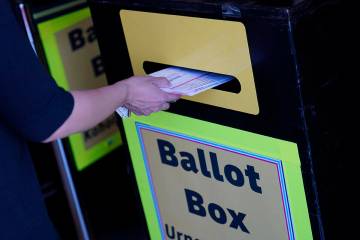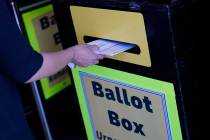VICTOR JOECKS: What social media and opioid companies have in common
One day, social media giants will be lumped together with tobacco companies and opioid manufacturers. The common link is addiction.
It’s taken years, but a national opioid settlement is on the horizon, although Nevada is seeking a separate settlement. Broadly speaking, the opioid companies stand accused of aggressively promoting prescription painkillers while minimizing the risks of addiction and overdose.
The statistics are eye-popping. Yearly, opioid prescriptions peaked at more than 255 million annually in 2012. The U.S. population was 226 million that year, excluding those under 20. Having more opioid prescriptions than adults is troubling, to say the least. That year, at least eight Nevada counties, including Washoe, Nye and Carson City, had more than 100 opioid prescriptions per 100 people, including children. In White Pine County, the rate was 176 per 100 residents. Clark County’s rate was 94 per 100.
By 2019, the numbers had dropped significantly in Nevada and across the country.
Opioid abuse can have deadly consequences. The number of annual deaths from prescription opioids rose from 3,400 in 1999 to 17,000 in 2017. Deaths don’t tell the whole story. Many more people suffer from addiction, which takes a tremendous toll on families and communities.
Let’s hope the money governments obtain from a settlement will actually go toward helping those with opioid addiction. But the precedent isn’t promising. Nevada used some of the funds from the tobacco settlement to offer college scholarships. Not exactly a direct connection to smoking cessation or medical bills from cancer patients.
The tobacco settlement was the forerunner to the opioid case. Cigarettes are legal. But tobacco companies came under fire for hiding and downplaying the link between cigarettes and cancer.
It’s the rare company that proactively tells its customers that using its product can be hazardous to their health. Perhaps that’s why social media companies aren’t forthright about the dangers their products pose, especially to children.
Social media certainly has benefits. A 2020 survey by Common Sense Media found 53 percent of teens said it helped them stay connected during the pandemic. But social media poses significant risks to some users.
Earlier this month, The Wall Street Journal released a bombshell report on internal research on Instagram, which Facebook owns.
“Thirty-two percent of teen girls said that when they felt bad about their bodies, Instagram made them feel worse,” a slide from a March 2020 presentation stated. The slides were shared on an internal message board that the Journal reviewed. The problems seem to stem from the platform’s focus on physical beauty.
“We make body image issues worse for one in three teen girls,” a 2019 slide said. Another said, “Teens blame Instagram for increases in the rate of anxiety and depression.”
One presentation said that 6 percent of U.S. users who had suicidal thoughts traced them to Instagram. That’s terrifying. If you have teens, taking away their phones — or limiting usage — could save their lives.
Another document the Journal reviewed said teens wanted to spend less time on Instagram, but “feel unable to stop themselves.” They’re addicted. No wonder. Social media companies have designed their sites to keep kids and adults coming back, using techniques known as “brain hacking.”
Facebook hasn’t been forthcoming with this information either. Absent someone sharing this with the Journal, it would presumably still be unknown to the public.
A prediction: One day in the future, attorneys general will sue social media companies on similar grounds as the opioid lawsuits. Their products have addicted a generation with destructive results.
Contact Victor Joecks at vjoecks@reviewjournal.com or 702-383-4698. Follow @victorjoecks on Twitter.























